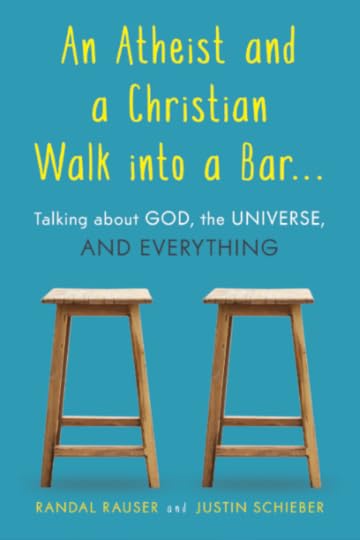Randal Rauser's Blog, page 150
June 24, 2016
The Cover for An Atheist and a Christian Walk into a Bar
You are insignificant; therefore, God doesn’t exist: Reflections on the Worst Arguments Against Christianity (Part 3)
Next up in our ongoing survey of bad arguments against Christianity we have Jonathyn42 who offers the following:
“An in-law of mine described to me the ‘real’ reason she now rejects Christianity: when tripping on acid, she perceived herself to be wholly insignificant, and thus God doesn’t exist. (She said this knowing that I’m going into the philosophy of religion.) For me, this takes the cake.”
Reconstructing the Argument
Jonathyn42’s in-law seems to have left us with an enthymeme (an argument with at least one unstated premise). Somehow we’ve moved from “I am wholly insignificant” to “Therefore, God does not exist.” Perhaps, the complete argument looks like this:
(1) If God exists then human beings are significant.
(2) Human beings are insignificant.
(3) Therefore, God doesn’t exist.
The first problem is that “wholly insignificant” is an ambiguous predicate. And on some readings it is wholly consistent with Christianity. After all, existential ruminations on human insignificance are a well established part of the Judeo-Christian tradition. As the psalmist observed, “What is man, that thou art mindful of him? And the son of man, that thou visitest him?” (Ps. 8:4 KJV). And then there is Puritan Anne Bradstreet’s memorable description of the human span of life, “O Bubble blast, how long can’st last?”
In that case, (1) should be rejected since God’s existence is consistent with human insignificance.
Charity requires us to find another interpretation of the predicate, one that is indeed inconsistent with (Christian) theism. On a second reading, the predicate could be alluding to the lack of objective meaning in life. In the immortal words of Freddie Mercury: “Nothing really matters, anyone can see. Nothing really matters to me.”
(1′) If God exists then human lives have meaning.
(2′) Human lives have no meaning.
(3) Therefore, God doesn’t exist.
Confabulatory Concerns
It could be that something like our second argument gets at the root of the in-law’s reasoning. It is also possible, however, that we are presently engaged in an exercise in confabulation, the process of unintentionally filling in gaps in reasoning with fabricated lines of reasoning after the fact. Confabulation is easy and oh so tempting. In a moment you can form a belief, and in the minutes, hours, and days that follow you can justify that belief with elaborate lines of reasoning as if those lines of reasoning were present from the first.
So did Jonathyn42’s in-law make a valid deductive inference from an enthymeme with plausible premises? Count me skeptical. I’ve never taken any hallucinogenic drugs (although I once took an unexpectedly large hit of wasabi with my sushi which created a brief state of altered consciousness). But I suspect what in fact happened here is that the in-law underwent a personal subjective experience which make the proposition “God doesn’t exist” seem true.
Here’s the obvious problem. While Timothy Leary and his followers believed in the power of LSD and other halluciogens to open the mind, I am aware of no evidence that these psychoactive agents do, in fact, have that power. LSD may lead you to perceive a pink dragon in your living room, but once you learn of the tendency of LSD to produce such perceptual anomalies, you have an undercutting defeater for the belief that you did indeed see a pink dragon. Mutatis mutandis for the alleged insight that human beings are insignificant.
June 23, 2016
Jesus Mythicism: Reflections on the Worst Arguments Against Christianity (Part 2)
Our next candidate for the worst arguments against Christianity comes from Walter who writes:
“I would nominate Jesus mythicism as championed by Earl Doherty as the worst argument against Christianity.”
Fraternite seconded the suggestion:
“Agreed completely. There are any number of ways one could credibly take aim at the different Christianities out there, but this is most definitely not one of them. Jesus mythicism is bad science.”
I have written very little on Jesus Mythicism (where “very little” = “almost nothing”). There are a couple reasons for this. First, I’m not a New Testament scholar or ancient historian so the issues at play are generally outside my wheelhouse. Second, I admit to having reluctance to engaging Jesus Mythicism for much the same reason Neo-Darwinians are reluctant to engage young earth creationists. In short, I don’t want to give a fringe opinion more attention than it deserves.
Paradigm Shifting
A couple years ago I wrote a review of the Richard Carrier/Mark Goodacre debate on Jesus Mythicism which was hosted on “Unbelievable”. Carrier is widely recognized to be the best of the Jesus Mythicists. If you are going to find a creative, clever, and comprehensive attempt to defend the claim that Jesus was not a historical person, it will be here. Having said that, the sense I get listening to Carrier’s defense is that it exhibits motivated reasoning in its most rigorous form, i.e. a determined attempt to use reason and evidence to defend a desired conclusion.
In my review, I honed in on an analogy in which Carrier/Goodacre’s Mythicism vs. Realism debate parallels the historic Locke/Berkeley Idealism vs. Realism debate:
“What really struck me about the debate as it unfolded was that it sounded like how a debate might have unfolded between John Locke and George Berkeley on the existence of the physical (i.e. extra-mental) world. As you probably know, John Locke was an old-fashioned realist in that he believed there was a physical world external to our minds. Locke argued that this world consisted of extended substance with primary qualities as well as our minds which added secondary qualities (e.g. color) to our experience of that world. Berkeley demurred. He saw no need to posit a distinction between primary qualities in a physical world and secondary qualities in the mind. Instead, he insisted that whenever you say you’ve experienced the external world, what you have in fact experienced is an idea — a color, a texture, a smell, a visual shape — and that is simply a qualification of your mind. In other words, you find that your experience of the world requires only minds and ideas. (All qualities of experience — or ideas — are “secondary” mental events.) To postulate an external physical substance to go along with minds and their ideas is simply unnecessary.
“In much the same way that Berkeley says “When you look at all the data you find it requires only minds and ideas; It doesn’t require an external world” so Carrier says “When you look at all the data you find it requires only a mythical Jesus resurrected in the heavens; It doesn’t require a historical Jesus”. In my view, both idealism and mythicism are ripe for refutation, but it never struck me before how much the latter, like the former, is grounded in a paradigm-shift evaluation on the exact same set of data.” (See “The new Idealism? A perspective on the Richard Carrier-Mark Goodacre debate on Jesus Mythicism.”)
To bring this back home to the current topic of discussion, one can choose to be an idealist if they so choose, but the fact that idealism can be extended to cover the data of experience doesn’t make it the most natural or reasonable conclusion. And it provides no reason to abandon world-realism. By analogy, the fact that the most sophisticated and imaginative forms of mythicism can be stretched to cover all the ancient data (or more less) doesn’t make it the most natural or reasonable conclusion.
Conspiracy Theories on the Fringe
In conclusion, I want to return to my observation that Jesus Mythicism is a fringe theory reminiscent of young earth creationism. As you probably know, the young earth creationists have explanations for the fact that the vast majority of scientists are Neo-Darwinians. Those explanations include a range of conspiratorial elements such as sin and rebellion, secular humanist paradigms, concerted institutional attempts to quash young earth creationist voices, and so on.
It’s interesting then to hear the same kind of conspiratorial thinking among Jesus Mythicists. Just replace “Neo-Darwinian consensus” with “Jesus consensus” and let the rhetorical bombs fly. I made this point in my article last year titled “My abortive Nuskeptix conversation with atheist Raphael Lataster“. In the article, I noted that prior to my online encounter with Lataster I sampled several of his interviews and was deeply disheartened at what I heard:
“Throughout the interviews I sampled I found Lataster to be abrasive and extremely condescending and dismissive toward those he disagrees with. For example, in his Skepticality interview the interviewer asks Lataster, who defends a version of Jesus mythicism, why so many biblical scholars and ancient historians (even religious skeptics like Bart Ehrman!) discount mythicism and accept that Jesus was a historical person. This is a crucial question and one would expect a reasonable person, even one taking a fringe view like Jesus mythicism, at least to concede that the consensus opinion is informed by reason and evidence. But Lataster doesn’t concede this, and instead he opts to attribute the consensus opinion to “dogma” driven by various possible ignoble motivations. Here’s how he puts it:
“In general, there is a great reluctance to accept the idea that there was no historical Jesus. It’s very well accepted within scholarship, even biblical scholarship, that the Jesus of the Bible [aka the Christ of faith] is a myth. […] But even those like Bart Ehrman, even those who are atheists, and reject the biblical Jesus, quite a lot of them actually accept and, I think dogmatically assert, that there definitely was a historical Jesus behind it all. And there’s many reasons for that. It could, it could have to do with ego, it could have to do with finances. But it’s very important to them that Jesus did exist as a human being.” (51:00)
“Pause for a moment to take in the extraordinary hubris of that statement. Rather than acknowledge that a world-class scholar like Bart Ehrman has reasons for accepting the historicity of Jesus, Lataster claims that Ehrman’s belief (and that of all other scholars in this consensus) is merely a dogma, one which could be driven by various factors like personal ego or “finances” (e.g. research funding).
“Though the podcast is called “Skepticality”, the interviewer expresses no reservations when Lataster dismisses the opinion of the vast majority of biblical scholars and ancient historians as “dogmatism” driven by self interest. (Unfortunately, this didn’t surprise me as I have often noticed that self-described skeptics who typically express great skepticism about fringe positions seem to table that skepticism when the fringe position suits their personal interests. Yes, the confirmation bias is alive and well in the “skeptic” community.)”
Perhaps Lataster should next try his hand at explaining the government cover-up of Roswell and Area 51. Better yet, he might try explaining why the current warming of the earth is not linked to the burning of fossil fuels. Perhaps Lataster can explain the consensus among climatologists by alluding to a similar range of factors: personal ego, finances, etc.
Just in case I haven’t been clear enough thus far, let me sum up by stating that I agree with Walter and Fraternite that speculative fringe theories buttressed by conspiratorial rhetoric do not provide good reasons to reject Christianity.
June 22, 2016
Dawkins’ Central Argument: Reflections on the Worst Arguments Against Christianity (Part 1)
I asked for my readers to share some of the worst arguments against Christianity … and they did not disappoint. In this article I’m going to begin a series working through those arguments.
First up, we have Adam Omelianchuk who takes issue with Richard Dawkins’ central argument against God as presented in Dawkins’ massive bestseller The God Delusion. (For a fuller rendition of the argument see chapter 4 of the book.) Adam summarizes Dawkins as follows:
1. The more complex something is the more improbable its existence is.
2. God is the most complex being there could be.
3. Therefore, God is maximally improbable.
He then provides the following quote from page 138 of The God Delusion where Dawkins summarizes his claim:
“However statistically improbable the entity you seek to explain by invoking a designer, the designer himself has got to be at least as improbable. God is the Ultimate Boeing 747.”
The first thing to note is that Dawkins’ argument is how it is extremely limited in scope. Given the centrality of the argument in the book, you’d be led to believe it aims to demonstrate that God is a delusion. On the contrary, the argument is in fact a rebuttal to the argument from design. Consequently, even if Dawkins’ argument against the argument from design is, as he opines, “unanswerable”, it would only apply to those who ground theistic belief in an argument approximate to the one he is rebutting. And here’s a simple fact: the number of theists who base their theism on an argument from design is minuscule.
Fair enough, the argument may be far more limited in scope than Dawkins would have us believe. But that would just mean that argument is oversold. Why think it is bad?
Two reasons.
First, the argument assumes that God is complex. God may indeed be “complex” in the way that calculus is complex (i.e. “hard to understand”). But as Richard Swinburne has argued, as an explanatory posit (which is the manner of complexity relevant to this discussion) God is surprisingly simple. For a good introduction to Swinburne’s reasoning see Is there a God? rev. ed. (Oxford University Press, 2010). In chapter two Swinburne summarizes four key criteria that define a simple explanation. In the following chapter he demonstrates how God satisfies those criteria. Thus, the claim that God is a complex hypothesis is false. (Of course, Dawkins could always try to mount a rebuttal to Swinburne. But until he does so, his claim that God is complex must be rejected.)
Second, Dawkins’ argument is based on a fallacious assumption that one must be able to explain a cause before one can invoke that cause to account for an effect. This is false. Consider the example given by William Lane Craig. Imagine, Craig proposes, that we were to discover a spaceship on the dark side of the moon. Any cause of the spaceship would be more complex than the spaceship. And yet, it is patently obvious that it would be sensible to posit an intelligent causal explanation (i.e. an alien intelligence) to explain the origin of the spaceship.
For these two reasons, Dawkins’ argument is indeed a very poor argument. How depressing to consider that it is the centerpiece of a book that sold over two million copies.
June 20, 2016
Share Your Candidate for the Worst Argument Against Christianity
Let’s have some conversation. I’d like to invite folks to share their comments here on what they believe to be the very worst arguments against Christianity. The only stipulation is that these are arguments which you’ve heard somebody defend. Preferably, they are arguments that you’ve heard more than one person defend. If you can document them in a book or online resource, that’s even better. Share your candidates for the worst arguments below and I’ll write a follow-up article to offer my own thoughts on the discussion.
And to be fair, once we’ve concluded that discussion, we can repeat the process, albeit with a focus on the very best arguments against Christianity.
But that’s for later. This discussion thread is devoted to the worst arguments.
And now, the floor is yours!
A Review of OJ: Made in America
 It was June, 1994 and I was taking summer courses at the University of Regina when I walked into the dorm lounge and saw everybody crowding around a television set watching aerial footage of a white Ford Bronco driving on the highway. “What’s going on?” I asked. One of the guys briefly turned and replied: “It’s O.J.!”
It was June, 1994 and I was taking summer courses at the University of Regina when I walked into the dorm lounge and saw everybody crowding around a television set watching aerial footage of a white Ford Bronco driving on the highway. “What’s going on?” I asked. One of the guys briefly turned and replied: “It’s O.J.!”
I had never been a big football fan, and so my knowledge of O.J. Simpson was sketchy at best. But over the next couple years, I would join millions in watching with morbid fascination as his life was laid bare in what would be widely billed as the “Trial of the Century.”
Later I remember my disbelief and anger when, on October 3, 1995, O.J. was acquitted of the murders of Nicole Brown Simpson and Ronald Goldman. I was completely incredulous as to how such a gross miscarriage of justice could occur. Even more incredibly, as I would later discover, the jury took a mere three hours to reach a decision after a 9 month trial.
The new long-form documentary O.J.: Made in America explains the logic of those ill-fated jury deliberations. As one of the jurors candidly put it, the acquittal of O.J. was “payback” for the beating of Rodney King. And while other jurors would surely not agree, it’s a jaw-dropping moment of candor which points us to the ultimate focus of this documentary.
In short, the real guilty party being placed on trial here is not simply O.J., but America itself.
Director Ezra Edelman builds his case with an initial contrast between the supposedly progressive 1960s Los Angeles and the bald and systemic racism of the Deep South. But that progressive patina was shattered with the Watts Riots of 1965. Edelman goes on to include several more instances of systemic racism and police corruption culminating in the 1992 riots that followed the acquittal of the officers who beat King. The inescapable lesson: racism remains a terrible problem on the progressive Left Coast. And it is only when we understand the depth of rage and alienation of those who endured this racism for years that we can begin to grasp the logic of that “payback”.
As for O.J. himself, he strikes me as a shell of a human being, that which aptly fits the profile of a clinical psychopath. Like Donald Trump, he is utterly obsessed with personal fame, adulation, and the satisfaction of his primal desires. He has no impulse control and he cavalierly manipulates people to his own ends while exuding a superficial charm.
But again, O.J. is merely a symptom of the problem. Whether it is the systemic racism underlying the trial or the nauseating tabloid news cycle that followed it, O.J. is a mirror on the culture that made him what he is. If he is Frankenstein’s monster, we have created him, and so we must share the guilt.
June 18, 2016
Cursing the Killer: On Praying the Imprecatory Psalms
Over the years I’ve preached my sermon on the imprecatory psalms on several occasions. Not surprisingly, when you return to an issue on multiple occasions, your position is liable to develop in particular ways. And so it is here. Initially my assessment followed that of C.S. Lewis: the imprecatory psalms represent a wicked desire for the destruction of one’s enemies which is critiqued by the model of Christ who shows us the need to love our enemies.
As I have reflected further on this issue, my position has taken on a crucial nuance. While I still retain the view that the curse of the imprecatory psalmist is not the place to stay, I am now reluctant to call those curses “wicked”. The reason? I paused to reflect on the depth of anger, rage, frustration, and hopelessness that would characterize the anguished souls who pray these prayers.

Fred Goldman, bereaved father and prayer of the imprecatory psalms
Since I just watched the outstanding long-form documentary O.J.: Made in America, Fred Goldman is in the top of my thoughts: a grieving father bereaved of his son by a psychopathic media darling who was acquitted of murder. What prayers would Fred Goldman pray knowing that “The Juice” had killed his son and gotten away with it? Can I begin to grasp the anger and rage of Mr. Goldman? I cannot. And consequently, I am reluctant to denounce any curses he may be inclined to call down on “The Killer”.
At the same time, I also find myself persuaded that anger and rage cannot be the last word. As reasonable and justified as our indignation at this kind of outrage may be, to retain this degree of hatred is nothing short of soul-destroying. And so, I find that the imprecatory psalms, when read within a broader canonical context, beckon us from an honest and open expression of our anger and rage to a point where we can move beyond it to forgiveness and reconciliation. I am not saying that this end goal need occur in this lifetime — in many cases I suspect it does not — but nonetheless I do believe it should remain the end goal.
And that brings me to the most recent example of my imprecatory psalms sermon which I preached at Daylight Church in Louisville, KY on June 5, 2016. In this version I pull back from simply denouncing imprecations as wicked (as does Lewis). Instead, I ruminate for a time on the types of offenses which would prompt one to pray those curses in the first place. So while I remain convicted that we must ultimately move beyond our rage and anger at our offenders, far be it from me to say when that point would be.
06-05-16 – I Object – Part 5 – Guest Speaker Randal Rauser – The Imprecatory Psalms from Daylight Church on Vimeo.
Is right action more important than right belief?
Yesterday I published an article with Unfundamentalist Christians, a blog to which I contribute on occasion as a guest-poster. The article is titled “Is it more important to believe the right things or to do the right things?” Within it I develop a thought experiment which I first presented in my 2011 book You’re not as Crazy as I Think and then again in an article in this blog.
June 17, 2016
96. Those Without Religion: Cory Seibel on the Nones


Dr. Cory Seibel
When they are asked to provide their religious affiliation, they reply “none”. Religious free agents, free to be secular or spiritual. But they definitely aren’t religious. And their ranks are growing. Over the last two decades the numbers of people disaffiliating with any religious tradition has continued to rise. But what should we think of the nones? Why do they withdraw from religious communities? What are their current beliefs (or lack thereof)? What are the future projections for their growth? And is there something Christians can do, in particular, to stem the tide of the loss from their own communities?
In this episode of The Tentative Apologist Podcast I sit down with Dr. Cory Seibel to discuss the nones. Dr. Seibel has a PhD from the University of Pretoria and an MTh from Spurgeon’s College, London. Currently he is a pastor on staff at Central Baptist Church in Edmonton and an affiliate professor at Sioux Falls Seminary in South Dakota.
For the last fifteen years Dr. Seibel has focused his research on generational dynamics in the church and society. In our conversation we focused on his conference paper titled “There Arose Another Generation: Learning from Atheistic and Agnostic ‘Nones’ Who Have Left the Church.”
You can visit Dr. Seibel online at www.coryseibel.wordpress.com.
June 12, 2016
The Trent Horn – Raphael Lataster Debate
In my opinion, Raphael Lataster is one of the worst public debaters today for the skeptical position. He has a scattershot approach and seems unable to engage with his opponents’ positions. To top it off, he behaves in a highly narcissistic manner. (Consider how in this debate he claims that Bill Craig refuses to debate him. Yeah Raphael, it’s called the first rule of debates: “You don’t punch down.”) Incredibly, Lataster claims to be writing a doctoral dissertation critiquing the case for God’s existence as given by Richard Swinburne, William Lane Craig, and Thomas Aquinas. (!) Gee, if you’re going to cover that much ground, why not include Plantinga, Leibniz, and Kant for good measure?!
Contrast that with young Catholic apologist Trent Horn who is, in my opinion, among the best young debaters on the scene today. I look forward to the work Trent is going to do in the years to come.
In my opinion, Raphael Lataster’s weakness and Trent Horn’s strength are both amply on display in this recent debate:





